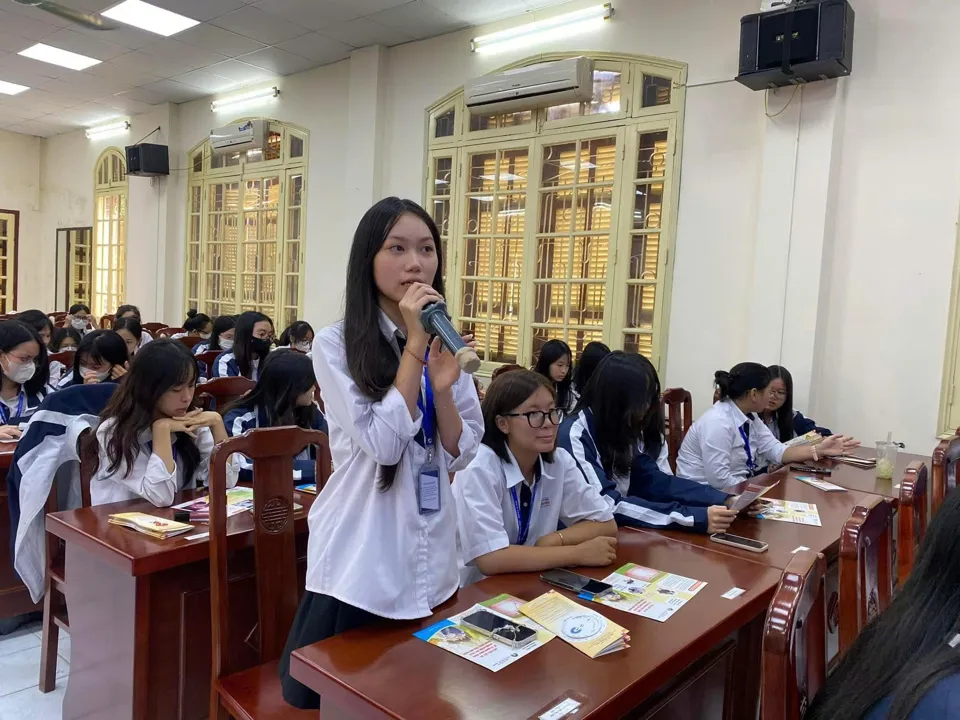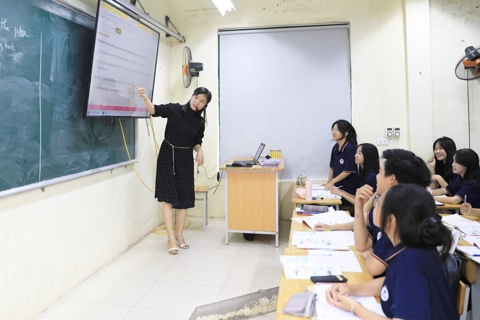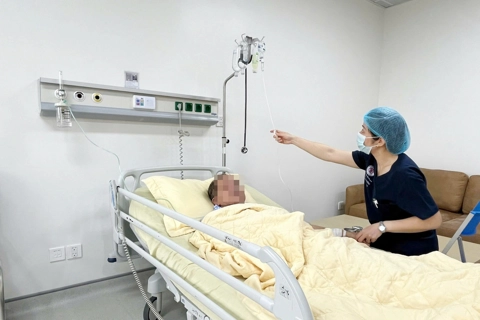Hanoi students embark on innovative English self-learning program
Hanoi will strive to make English the second language in all schools, as it is the universal language.
More than 590,000 middle and high school students in Hanoi have participated in the "Month of Self-learning Foreign Languages" initiative one month after its launch.
| A secondary school student in Hanoi during an English lesson. Photo: kinhtedothi.vn |
This figure represents 64.3% of the total number of students in these two levels in Hanoi, according to the Hanoi Department of Education and Training.
The department also reported that nearly 15,000 teachers have registered for the initiative.
Recognizing the benefits and practical significance of the initiative, many principals signed up their students and teachers immediately after the launch event.
Some principals have had speeches in English and other foreign languages to encourage student participation.
Several schools have helped students register for the initiative, which began on January 9. Students are encouraged to spend at least 30 minutes a day learning English on FSEL's online language learning platform.
Teachers support students by developing self-study materials and organizing language clubs to create an environment that stimulates the use of English and other foreign languages.
The initiative involves many businesses and educational organizations, including Five-Star E-Learning JSC, Language Link Vietnam, and Smartschool JSC, which have sponsored thousands of learning and testing accounts for students and teachers.
From now until February 19, students will continue to verify their accounts and complete the English proficiency test on the FSEL platform. Between February 20 and March 20, they will engage in self-study using technology-based tools.
The Hanoi Department of Education and Training has called on businesses and educational organizations to increase their support for teachers and students in using the tools.
The city hopes that these activities will improve English proficiency among teachers and students and narrow the language gap between urban and rural schools.
Through this initiative, Hanoi aims to establish English as a second language in schools, meet the demands of international integration, and lay the foundation for workforce development in the new era of national rise.
Typical examples to encourage students and teachers
Suburban districts face more challenges in education, especially in foreign language learning, than their metropolitan counterparts due to limited facilities, resources, and personnel.
Many suburban students do not prioritize foreign language learning, focusing instead on core subjects such as math, physics, chemistry, literature, and biology.
Recognizing these challenges, local schools in Hanoi have organized special training programs in recent years to improve the language skills of both students and teachers in rural areas.
In 2019, Ba Vi District launched a project to improve the quality of English teaching and learning, said Phung Ngoc Oanh, Head of the Ba Vi District Education and Training Office.
"First, we are working with the University of Languages and International Studies (Vietnam National University, Hanoi) to train teachers and improve their skills," he said.
In the early stages, the project was piloted in only 10 of 35 secondary schools, he said.
As its effectiveness was proven, the district expanded the program to all 35 secondary schools, he added.
Currently, all 69 primary and secondary schools in Ba Vi District have joined the initiative, according to Oanh.
"This project marks a breakthrough in improving English education in schools," he emphasized.
To improve students’ foreign language proficiency, schools must first enhance teachers’ qualifications, Oanh said.
Local teachers have received training from the Hanoi Department of Education and Training, university lecturers, and top English teachers in Hanoi, he said.
Another key factor in motivating students to learn foreign languages is creating an English-speaking environment for both teachers and students, Oanh added.
"Students should develop their English skills through drawing, visuals, slogans, singing and dancing to English songs, and participating in cultural performances, team games, English-themed booths, and English-language libraries," he said.
Field trips and experiential learning activities in English also help schools expand students' geographic and historical knowledge of local and national landmarks, the office head added.
Secondary schools in the district have organized book launches, Vietnamese cultural presentations in English, public speaking contests, and student exchange programs with elementary school students from urban districts, he said.
Teachers’ helping club
According to the Hanoi Department of Education and Training, a specialized club called "200+" has remained active, bringing together top English teachers from various schools.
Founded in 2022 with the participation of 199 IELTS-certified teachers, the club aims to improve the quality of English teaching, foster a supportive educational community, and ensure equal learning opportunities for all students and teachers, thereby promoting sustainable development in education.
Its activities extend beyond Hanoi's urban districts to remote areas where language education still faces challenges.
In August 2024, the club participated in an IELTS training course for 1,900 teachers. Throughout the program, members shared materials, teaching strategies, and test-taking skills to help their colleagues improve.
These training sessions not only improved English language skills, but also introduced teachers to modern teaching methods and technology applications that they could incorporate into their classrooms.
Furthermore, the club has organized specialized training workshops and online courses to support teachers in Yen Bai Province and other disadvantaged regions. It is also developing customized teaching materials, assessments, and supplementary courses based on local needs.
Tran The Cuong, Director of the Hanoi Department of Education and Training, said the club's activities have yielded significant results.
Thousands of teachers across Hanoi have obtained IELTS certification, with many gaining international teaching qualifications, solidifying their professional skills," he said.
Students in suburban and underprivileged areas now have greater access to effective English learning methods, boosting their confidence for important exams and future opportunities, he added.












